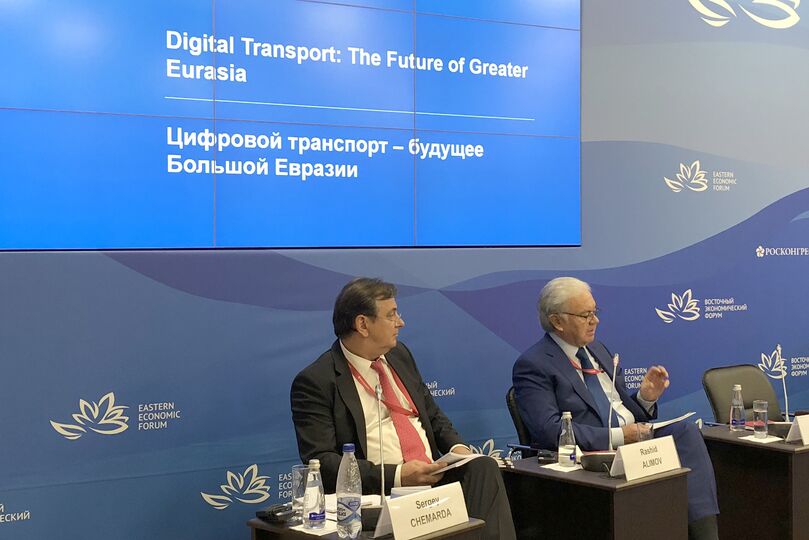On 12 September 2018, SCO Secretary-General Rashid Alimov attended the Eastern Economic Forum and spoke during the panel session Digital Transport: The Future of Greater Eurasia.
The discussion involved Minister of Transport of the Russian Federation Yevgeny Ditrikh; Russian Deputy Prime Minister Maxim Akimov; Special Presidential Representative for Environmental Protection, Ecology and Transport Sergei Ivanov; Minister of Commerce and Industry of the Republic of India Suresh Prabhu; Secretary of the Communist Party of Heilongjiang Province of the People's Republic of China Zhang Qingwei; Russian Railways Director General and Board Chairman Oleg Belozyorov and other high-ranking speakers from Eurasian and Asia Pacific states.
In his speech, Mr Alimov noted that the "transport system's cost-effective operation directly influences the development of international trade and economic cooperation in the SCO region and ensures close ties between nations, involving millions of people in proactive and constructive activities, introducing them to the achievements of global civilisation and causing positive shifts in international relations."
He added: "The further expansion of transport cooperation is called upon to influence prospects for developing and expanding the entire system of trade and economic cooperation throughout the Eurasian region and to attract investment in interdependent infrastructure projects."
Mr Alimov recalled that cooperation in the area of road transport served as a driving force for expanded multilateral transport cooperation between SCO countries. This cooperation is in line with the SCO Member States Agreement on Facilitation of International Road Transport.
According to experts from the UN Economic and Social Commission for Asia and the Pacific, the Agreement ensures unimpeded vehicle traffic on over 15,000 kilometres of high-speed roads and also provides for freight traffic. The longest artery exceeds 9,000 kilometres, and the routes opened up by the Agreement generally provided landlocked countries with new opportunities for trade and economic and transport-infrastructure cooperation, as well as facilitating the development of regional interdependence.
The SCO Secretary-General underscored the fact that over 244,000 kilometres of railways have been built and currently operate on the territory of SCO member states. "Today, we are working proactively to launch cooperation in the sphere of railway transport. On 19 September, the first meeting of the heads of SCO member states' railway administrations will be held in Tashkent. SCO experts are discussing the development of an integrated transportation management system, which will become the next stage in the further intensification of intra-SCO transport cooperation," he noted.
"The aim of the system is to create a combination of technologically interdependent transport lines of communication for handling vehicles, freight and passengers, as well to develop information and pricing/rates systems, and set up agencies and mechanisms for the management of various types of transport, functioning in line with SCO member states' national legislation that should subsequently be harmonised," Mr Alimov noted.
He added that the "further expansion of transport cooperation is called upon to influence prospects for developing and expanding the entire range of trade and economic cooperation throughout the Eurasian region and to channel investment into interdependent infrastructure projects."
"The cost-effective use of transit routes via the vast SCO region by means of eliminating various barriers to international transport, streamlining the regulatory-legal framework and pricing/rates policies and bringing them into accord with international standards, as well as by developing the required institutional foundation for implementing sustained infrastructure projects will open up the full potential of the global trade system, allowing the attainment of a new level of production and commercial activity in SCO member states and creating new facilities of the socioeconomic infrastructure, " Mr Alimov said in conclusion.
The SCO customarily takes part in the Eastern Economic Forum. Participants in the 2018 Eastern Economic Forum are to discuss key issues of economic, trade, investment, and cultural cooperation in the Eurasian and Asia Pacific regions.
